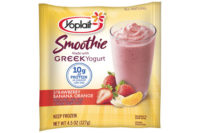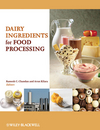Dairy Picking

If ever there was any doubt of yogurt's mainstream appeal, it certainly was laid to rest this year, as the delectable could be found seemingly everywhere—fortified, as an indulgence, drinkable, etc. The Dannon Co. started the ball rolling in March with Dannon la Crème Rich and Creamy with Chocolate Pieces, described as “the perfect dessert combining the wholesomeness of yogurt with the decadence of chocolate.” The 15oz container, similar in size to a pint of ice cream, boasted pieces of premium chocolate mixed with smooth, creamy la Crème yogurt, but with 48% less fat than regular ice cream.
The pre- and probiotic benefits from yogurt may be widely known, but General Mills Inc. became the first in the U.S. to enhance refrigerated yogurt with plant sterols. Yoplait Healthy Heart featured a label notifying consumers, “Plant sterols, eaten twice a day with meals for 0.8g daily total, may reduce heart disease risk in a diet low in saturated fat and cholesterol.” The Yoplait Healthy Heart product has 0.4g of plant sterols per 6oz. Priced the same as other Yoplait yogurts, Healthy Heart was found in four flavors: Cherry Orchard, Harvest Peach, strawberry and strawberry banana.
Fuse on First
Yogurt even expanded beyond its traditional presentations, as Wells' Dairy Inc. fused the treat with flavors to complement a variety of finger foods. Blue Bunny IncreDiples were yogurt-based dips containing savory herbs and pieces of fresh chopped garden vegetables, in three flavors: Fajita Lime, Spicy Buffalo and Taco Fiesta. IncreDiples promise 50% fewer calories and 82% less fat than snack dips made from sour cream. Boasting 30 calories and 1g of fat, the dips also could be used as salad dressing, as a condiment on sandwiches or in a variety of recipes, assured the company.Flavor fusion also appeared in shredded cheese this year, as Sargento Foods Inc. presented Bistro Blends of cheddar salsa with tomato and jalapeño peppers; mozzarella and asiago with roasted garlic; and mozzarella with sun-dried tomatoes and basil. The line targeted cooking enthusiasts seeking a simple means of infusing favorite dishes with bold flavors, but also was offered by the company's foodservice and ingredient cheese divisions.
Watch It
Wells' Dairy brought Weight Watchers into the dairy segment for a line of branded yogurts and smoothies. The 6oz offerings of Weight Watchers yogurt contain 100 calories (and cost only one “point” value for those following the Weight Watchers weight-loss program) and could be found in nine flavors: vanilla, strawberry, black cherry, blueberry, peach, raspberry, key lime pie, lemon cream pie and strawberry banana.Weight Watchers smoothies, meanwhile, were 7oz beverages containing fruit and fat-free yogurt. They, likewise, cost only one “point,” but were limited to four flavors: strawberry, raspberry, mixed berry and strawberry banana.
Wells' Dairy did more than just work with Weight Watchers for smoothies, however. Its Lite 85 Yogurt Smoothies expanded the Lite 85 yogurt into a portable, 7oz smoothie bottle. The smoothies blended fruit and non-fat yogurt, while boasting only 85 calories per serving.
Weight Watchers and Wells', however, were not the only entrants into the yogurt smoothie area this year. California's Brown Cow Farm (owned by Stonyfield Farm) launched 32oz bottles of low-fat yogurt smoothies in a pair of flavors—strawberry and original. Setting this launch apart, according to Brown Cow, is that the line has 15% to 30% less sugar than leading smoothies, without any artificial sweeteners. Furthermore, the company assures, the smoothies are made with milk from cows not treated with recumbent bovine growth hormone (rBGH).

On the Shelf
Yogurt smoothies made their way into the aseptic market with some major introductions this year. Steuben Foods Inc.'s Whitney Foods Inc. launched a line of the products in single servings. Yo on the Go could be found exclusively at Costco club stores. The 8.25oz strawberry smoothies were based on low-fat yogurt but did not feature live and active cultures, due to the aseptic procedures required to make them shelf stable. Nevertheless, they were marketed as a blend of low-fat yogurt and fruit, promising 30% of 10 essential vitamins and minerals, 180 calories and 3g of fat, while also providing 20% of the Daily Value of calcium.Aseptic packaging also played in a bid by a major soft drink maker to expand into milk products this year, with Pepsi attempting to capitalize on its Quaker brand awareness. Quaker Milk Chillers was a line of flavored milk beverages made with 2% reduced-fat milk, fortified with calcium and seven essential vitamins. Since the products contained more than 50% milk, they were allowed to carry the Real seal. Also qualifying for PepsiCo's Smart Spot symbol (thanks to having 45% to 50% less sugar than leading flavored milks and being an excellent source of calcium), Quaker Milk Chillers were sweetened with a blend of natural and no-calorie sweeteners, including sucrose, sucralose and acesulfame potassium. The 14oz aseptic containers had a shelflife of six months, required no refrigeration until after being opened and used Pepsi's ambient-temperature distribution system, not to mention boasting the more-healthful-oriented Quaker moniker.

Feeling Low
Joining the low-carb party just as things were winding down, H.E. Butt Grocery Co. (H-E-B) developed the first low-carb, lactose-free milk product. MooTopia was real milk, but featured 60% less sugar, 35% more calcium, 75% more protein and 4g of carbohydrates per serving. Also enhanced with vitamins A and D, MooTopia was found in 11-, 32- and 64oz plastic bottles.Bravo! Foods' Breakfast Blenders likewise made use of lactose-free milk in its Breakfast Blenders. Similar to but most definitely not a yogurt smoothie, this flavored milk boasted added protein and fruit-based fiber and nutrients. Found only in 7-Eleven stores, the range included such flavors as double French vanilla, chocolate raspberry and vanilla peach.
Lactose-conscious consumers also were served by Special Request Lactose Free Skim Plus from Farmland Dairies LLC. The ultra-pasteurized, fat-free milk was claimed to have the same creamy taste and smooth texture of Skim Plus but minus the lactose. Considering the National Digestive Diseases Information Clearinghouse estimates nearly 90% of the Asian population, 75% of the Hispanic population and 17% of the American population, in general, are lactose-intolerant, the products would seem to have a built-in market. The company also sought to enhance the healthful aspects of the product by endowing it with 34% more calcium and 37% more protein than its leading competitor, while at the same time offering a 55-day shelflife.
The Hispanic population seemed a particular focus this year for manufacturers, notably in the ice cream segment. Blue Bell Creameries added a “southwest-flavored” Bunuelos ice cream, a cinnamon flavor with cinnamon pastry and praline sauce, while Tropicale Foods introduced Helados Mexico ice cream bars in such flavors as lime, mango, pineapple, coconut and rum raisin.
Dean Foods also expanded its line to focus on the Hispanic consumer base in a market test this year. Latin American fruits inspired Tampico frozen desserts, and the premium range included ice cream and sherbet, the latter in citrus and lime flavors. The former, meanwhile, boasted such flavors as banana pineapple, cantaloupe, coconut, guava, horchata, mango, and strawberry banana. The company noted the vanilla variety was made with brown sugar, commonly used in Hispanic countries. The Tampico labels were bilingual, including the Nutrition Facts panel, and testing centered upon areas with sizable Hispanic populations (Texas, Florida and Chicago).
Dean also focused upon yogurt under its Horizon Organic brand. The line's low-fat yogurt was formulated to include short-chain fructo-oligosaccharides, which support the growth of probiotic bacteria that provide health benefits such as increased calcium absorption and an improved immune system.
Fantastic Fortify
While probiotic-fortified yogurt may be old news, one of the hotter ingredients of the year would appear to be omega-3 fatty acids. Woodstock Water Buffalo, according to the company president, was the first U.S. company to fortify yogurt with omega-3s, and each 170g serving of Woodstock omega-3-fortified yogurt contained 100mg of eicosapentaenoic acid (EPA) and docosahexaenoic acid (DHA). Made from fresh water buffalo milk, the yogurt could be found in strawberry, raspberry and black currant flavors.Functional products were a route to healthful consumers for many companies this year, but some also took the opportunity to retaliate against growing concerns about portion distortion. Breyers CalSmart Cups from Good Humor-Breyers (Unilever) were one such example. Each 4oz cup of low-fat, no-sugar-added ice cream had only 70 calories, half the amount of regular Breyers ice cream.
When looking at dairy introductions over the past year, it is important to note that the segment is seeing many of the same trends as other categories: notably, omega-3 fortification and portion control. More of the same, particularly the latter, can be expected for the coming year.
Much of the information in this article was derived from Mintel International's Global New Products Database, www.gnpd.com, 312-932-0400. Special thanks also goes to sister publication Dairy Foods magazine.
Sidebar: Going Global
Cholesterol concerns were not unique to the U.S., and Swiss company Emmi sought to help cheese lovers with miniCol, a cheese alternative which used fat-free vegetable oil and plant sterols to promise lowered cholesterol. Blood pressure, likewise, got some relief with Valio's release of a line of fermented milk-based drinks in Spain. The range included the blood pressure-lowering Evolus active complex, based on bioactive peptides and a beneficial mineral composition.Plant stanols were key to Benecol milk launched in Finland. Valio's Benecol yogurts and milk shot-style drinks also contained plant stanols, proven to “reduce the amount of harmful low-density lipoprotein (LDL) cholesterol in the blood.” The company claimed a “sufficient daily dose (2g) of plant stanol can be obtained from just two to three glasses of the milk drink.”
Consumers looking to add “vitality” were in luck in Spain, where Central Lechera Asturiana introduced Natur Jalea. This milk drink was enriched with royal jelly and aloe vera, and followed similar innovations by the company. Its Natur Linea range was enriched with conjugated linolenic acid for “better fat metabolism,” while it added fiber to milks and yogurts in its Natur Fibre range.
Better-for-you products also were found in the East. Taiwan, for example, saw Stardard Dairy's launch of Yoplait Perle de Lait Original Flavor Yogurt Drink. This low-sugar yogurt beverage included lactoferrin to promote iron absorption and enhance immunity.
A Vietnam introduction was another that promoted healthfulness through fortification, but it may have been more notable for its flavor. Royal Corn Fresh Sweet Corn Milk Drink from Saha Charoen Enterprise included sweet corn and green tea. The product was high in calcium, vitamins A, E and B1.
In France, Yoplait combined the benefits of dairy with soy proteins to launch Bioplait in original, strawberry and peach flavors, with packaging touting soy protein's role in maintaining heart health.
Looking for a reprint of this article?
From high-res PDFs to custom plaques, order your copy today!







